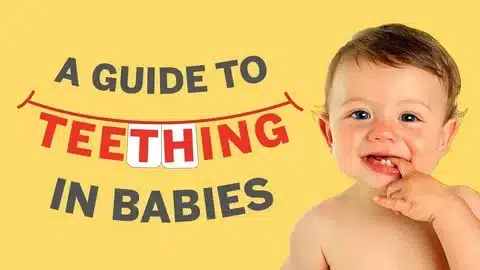Teething can be a tough phase for both babies and parents. The constant fussiness, sleepless nights, and excessive drooling make it challenging. But with the right approach, you can ease your baby’s discomfort and make teething more bearable.
Your baby’s first teeth are an exciting milestone, but they also mark the beginning of a lifelong journey in oral care. As your child grows, if alignment issues appear, options like invisible braces in Dubai provide a discreet and effective way to ensure a healthy, confident smile.
Getting to Understand Baby’s Teething Better
What Do We Mean by Teething?
Teething is when a baby’s first teeth start pushing through the gums. This natural process usually begins a few months after birth. While exciting, it can also be uncomfortable, leading to irritability and sleep disturbances.
Some babies sail through teething with minimal fuss, while others struggle. The discomfort varies, but most experience swollen gums, excessive drooling, and a strong urge to chew on anything within reach.
When Do Babies Start Teething?
Most babies begin teething around four to six months old. However, some may start earlier, while others don’t get their first tooth until after their first birthday. Genetics play a role in timing. If you or your partner had early or late teething, your baby might follow the same pattern.
Common Signs of Teething
- Excessive drooling, leading to chin rashes
- Increased chewing on hands, toys, or household items
- Irritability and frequent crying
- Swollen, tender gums
- Changes in sleep patterns
- Reduced appetite
How Long Does Teething Last?
Teething lasts until all primary teeth have emerged, usually around two to three years of age. Each tooth can take a few days to a week to break through. While some babies experience discomfort for just a few days, others may struggle for weeks. The good news? There are plenty of ways to ease their pain and keep them comfortable.
How to Soothe a Teething Baby
1. Use a Teething Toy
A good teething toy provides relief by giving babies something safe to chew on. A good option is soft rubber teethers designed for infants, but make sure that they are BPA-free.
Chilling teething toys in the fridge (not the freezer) adds extra comfort as cold helps numb sore gums. Do not go for frozen teethers, as they can be too harsh and leave the baby in extra pain rather than relief.
Also, avoid liquid-filled teethers, as they can break and leak harmful substances. Always supervise teething babies to ensure safety.
2. Massage the Gums
A gentle gum massage can work wonders. Use a clean finger or a damp, soft cloth to apply light pressure on your baby’s gums. This technique helps reduce soreness and provides instant relief. Many babies enjoy it, especially when done before naps or bedtime.
3. Offer a Cold Washcloth
A chilled washcloth is a simple yet effective remedy. Wet a clean cloth, wring it out, and place it in the fridge for a few minutes. The coolness helps soothe inflamed gums, while the texture provides a gentle massage. Always supervise your baby to prevent choking.
4. Try Chilled Fruit or Veggies
For babies who have started solids, cold fruits or vegetables make excellent natural teethers. Chilled cucumber sticks, banana slices, or carrot sticks can provide relief. Ensure pieces are big enough to prevent choking. Supervise your baby at all times while they chew.
5. Breastfeeding for Comfort
Many teething babies seek comfort through breastfeeding. The sucking motion can soothe sore gums and provide a sense of security. If biting becomes an issue, adjust positions or gently unlatch your baby when needed. Some moms find that offering a cold washcloth before nursing greatly reduces discomfort.
6. Distract with Play
Sometimes, distraction is the best remedy. Engaging your baby in fun activities can take their mind off the pain. Singing, dancing, or even a short walk outside can help. Teething can be frustrating, but a little playtime makes it easier for both baby and parent.
7. Consult a Pediatrician If Needed
While teething can be uncomfortable, it shouldn’t cause high fever, diarrhea, or extreme distress. If your baby seems excessively unwell, consult a doctor. Teething symptoms tend to overlap with other illnesses, so when something feels off, trust your instincts and seek professional advice.
In the end, no one knows a child better than their caregiver. If something doesn’t seem right, don’t hesitate to seek guidance from the best dental clinic in Dubai. A professional consultation can provide clarity, peace of mind, and help ensure your child’s long-term oral health.







